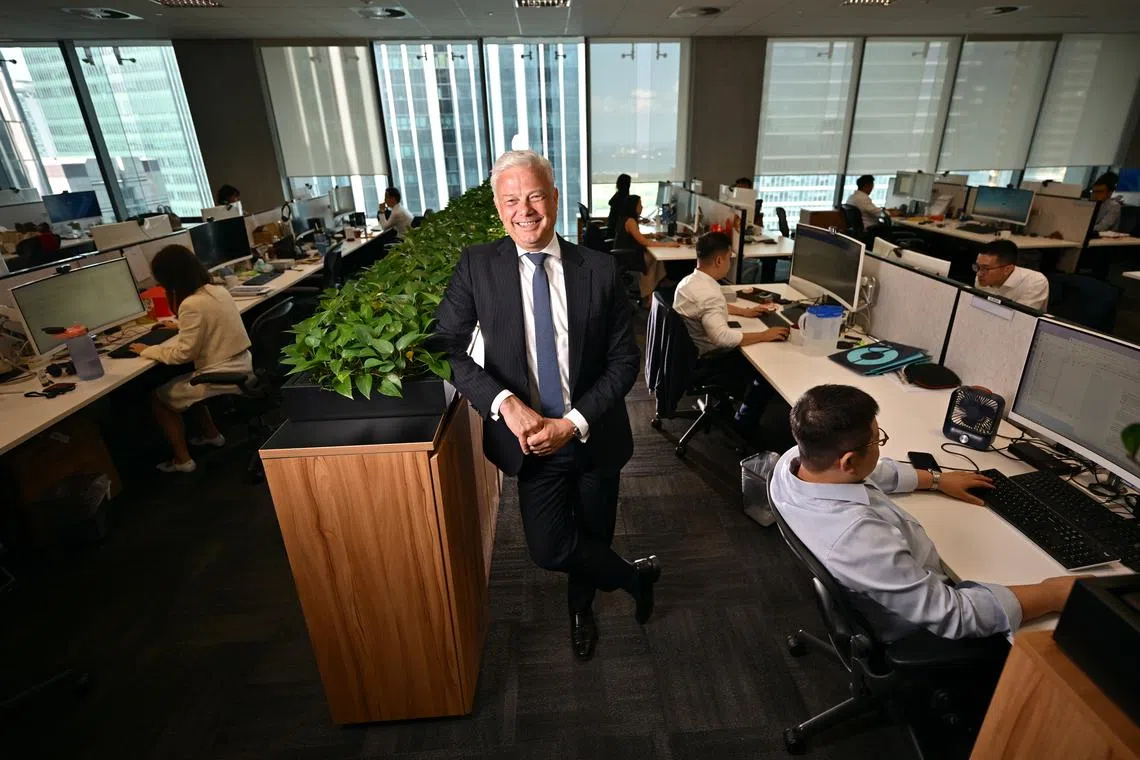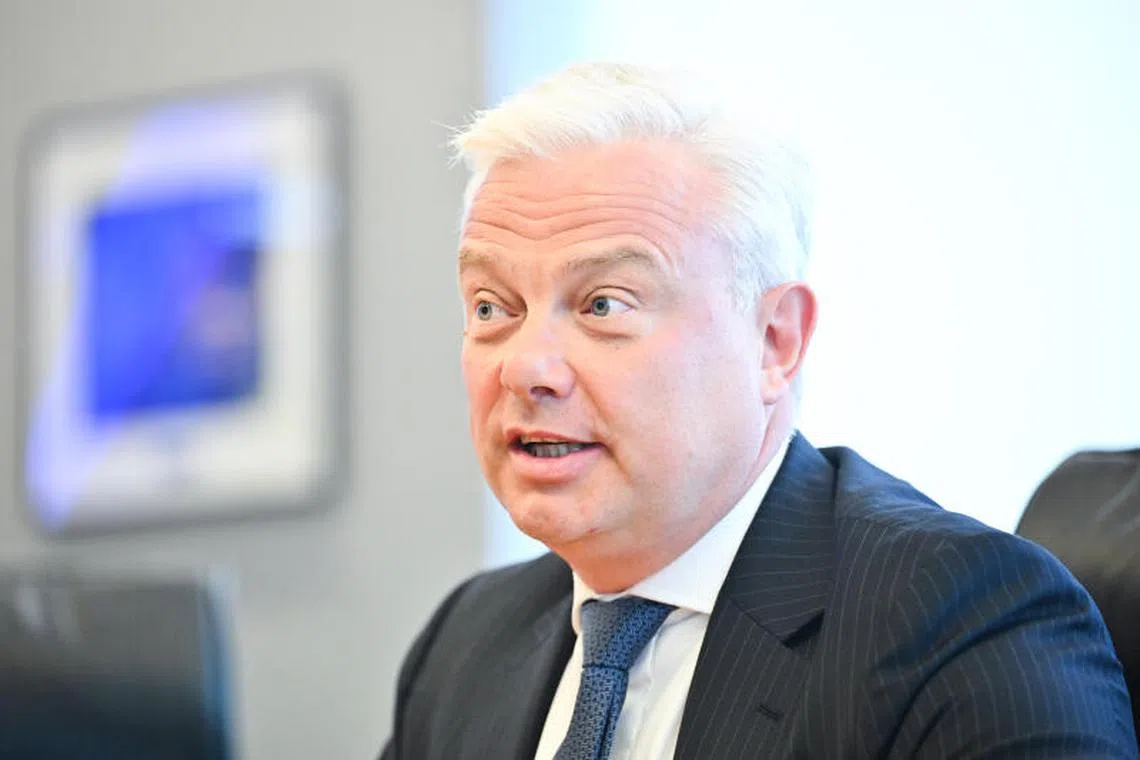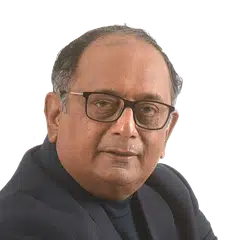In Good Company
As Schroders CEO works to turn around business, his advice to clients: Diversify!
Sign up now: Get ST's newsletters delivered to your inbox

Schroders chief executive Richard Oldfield at the global asset manager's office in Singapore on July 1.
ST PHOTO: LIM YAOHUI
Follow topic:
Entering the Schroders building in the City of London on his first day as chief executive officer last November, Mr Richard Oldfield’s first act was to move his office into the heart of the building, and meet graduates over coffee. Soon, those familiar with the place noticed that portraits of the founding family, who still control 44 per cent of the 221-year-old UK company, had been shifted from the entrance to another part of the building.
It is not known what the descendants of the founders thought of all this. But the forensic eye of the former PwC accountant – who for five years personally signed off on client HSBC’s accounts – seemed to have deemed the new office arrangements important to flag his intentions to modernise one of Britain’s hoariest institutions of finance.
The rest, you could say, is work in progress under what a recent Schroders client strategy update described as “a clear plan to profitable growth”, which includes a £150 million (S$260 million) reduction in costs over three years.
Although Schroders is regarded as the fifth-best brand in asset management globally and the only non-US firm on that list, profits had slid against a backdrop of rising costs and a shift by investors towards passive investing, pushing down its market valuation.
Who better to take the helm than a trained accountant with a practical approach to life – one who takes the train to work because it is faster than being driven?
Investors are eager to see the strategy bear results. As the 54-year-old Mr Oldfield settles into his job, they have cheered Schroders stock, which has risen 19 per cent in the year to date.
Meeting Mr Oldfield while he was in Singapore to celebrate Schroders’ 50th anniversary on the island earlier in July, I asked about his plans for the firm – which his predecessor Peter Harrison had steered towards focusing on private markets, wealth and a solutions arm offering financial management capabilities to companies.
Mr Oldfield began with the need to trim expenses, saying the £150 million in cost cuts was not an arbitrary number – it involved a clear series of actions.
“Think about it like a beautiful garden but overgrown, and we need to prune it back to let new growth come through,” said Mr Oldfield, who dislikes gardening. “Pruning is precise – you do not chop things at random, and you are very specific about what you want to do… We also said we would not invest in areas we didn’t think we had the edge.”
So, the real estate businesses in Australia and Germany are out – one sold, the other shut down. Now, questions are being asked about specific Schroders products: Will the capital and effort deployed yield better returns if redirected elsewhere?
An unspecified number of people – said to be in the hundreds – have been let go, but Schroders has also hired 217 people.
That’s the cost part. What about growth?
“The £150 million (cost cut) is net of investments in AI and other new technology, in new sales people to grow Schroders Capital, in premium capabilities in wealth management, in transformation, and in our public markets investment teams,” he said.
“We have also talked a lot about reshaping our public markets business through the use of technology and AI.
“And we have just launched another AI product within our private equity business that allows us to do enhanced analysis and evaluate far more potential investments than we could in the past because of the efficiency, and time saved. Those are the kind of areas we are investing in.”
Schroders had operating profit of £640.5 million in 2024. Mr Oldfield expects the public markets business to remain broadly stable at current revenue levels, reflecting market trends and eroding margins due to the asset mix clients want.
He anticipates the big growth to come from Schroders Capital, which helps institutional investors, insurance firms and pension funds to invest in assets such as private equity and real estate, as well as from the wealth business catering to high-net-worth and ultra-high-net-worth clients.
His targets: £20 billion in incremental business at Schroders Capital over the next three years, and another 5 to 7 per cent net new business annually in wealth.
The wealth business now accounts for close to £127 billion in assets managed by Schroders, and about 30 per cent of its profits. Schroders had a total of £779 billion in assets under management at the end of 2024, with about a quarter of that on behalf of clients in the Asia-Pacific.
None of this, he stresses, is meant to downplay the importance of the public markets business – the part most associated with Schroders in the public eye. The firm claims leading capabilities in fixed income, equities and multi-asset strategies.
So how does one steer through strange times such as when bonds and stocks – which normally move in opposite directions – fall in tandem and even the currency drops, as happened in the US earlier this year? And what advice does he offer clients in this environment?
Mr Oldfield, who projects Schroders as an active asset manager, said it is precisely in times of such volatility that active management becomes so critical. For instance, America’s tariff announcements make it imperative to move beyond country-level assessments to a company-by-company one, and that is where fundamental research becomes so essential.
“Our fund managers get to choose who they invest in, based on how the current environment plays out for each company. They look to generate alpha – basis point by basis point– and that is the only sensible way to navigate these turbulent markets. Passive investment, in contrast, is backward-looking. Index-based investing has taken us towards concentration risk.”

Investors, Mr Oldfield noted, had concentrated too much on US assets and the US dollar, forgetting the virtues of diversification. People are starting to realise that diversification isn’t such a bad idea after all, he said.
ST PHOTO: LIM YAOHUI
Alpha, in financial parlance, refers to the excess return on an investment compared with a benchmark or the overall market.
Investors, Mr Oldfield noted, had concentrated too much on US assets and the US dollar, forgetting the virtues of diversification.
“In recent months, people are starting to realise that diversification isn’t such a bad idea after all. So, they’re starting to rethink how to construct portfolios with more diversification, not just by asset class but also by geography and currency.
“Our advice to clients is: think broadly, think about diversification. Think about the degree of risk and exposure you want and, importantly, find the right balance – create portfolios that include both active and passive components to achieve the appropriate risk-return trade-off,” he said.
Schroders itself feels the pinch of a declining dollar; even sterling-priced funds can be impacted if they are invested primarily in US markets since the weaker dollar reduces the sterling value of those assets.
With all this talk of America’s soaring debt levels putting a strain on the dollar’s dominance, I asked if there were likely alternatives to the US debt market. Mr Oldfield noted that Asian debt markets are growing, and if regulatory reforms proceed in the European Union, there could be deeper debt markets there too.
“But, as we sit here today, the US – by virtue of its reserve currency status – remains the biggest provider of finance.”
What prospects does he see in the Asia-Pacific region?
Mr Oldfield is particularly bullish on India, which he labels a “high-conviction market” and Schroders’ second-best performing market globally, after the US.
The firm remains committed to China, the world’s second-largest asset management market after the US. Japan is still a country where Schroders wants to grow in, because of its size and the assets available for management. “In fact, the Japanese market might be the same size as the whole of the rest of Asia,” he noted.
As for Asean, it has the fastest-growing wealth pool globally, making it “super-attractive” for the asset management industry.
Mr Oldfield, the Yorkshire-born son of a coal miner, was the first in his family to go to university – York, in his case.
As a teenager during the British miners’ strike of the mid-1980s, he witnessed the power of community – something he has tried to carry into his working life.
People helped one another. If one family had more food, they shared it. If his family had coal for heating and the neighbour did not, they gave them half – better for both to be chilly than for one family to freeze.
“Even the banks helped,” he said. “Despite widespread mortgage concerns, no one lost their home. The experience taught me that you can make money, and still do the right thing!”


